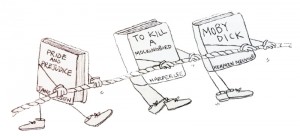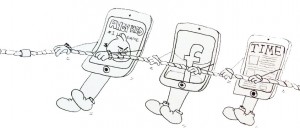

“To be or not to be?” or “I think therefore I am,” or “The unexamined life is not worth living.” Educational technology cannot help us as we face these three existential conundrums. Everyone must respond to them alone. Once one articulates a position, she might turn to educational technology to find out what others think. What educational technology can do is be a tool once we know what our own questions are and need information to contrive answers to those questions. The first encounter must be with the text of Shakespeare, Pascal, or Socrates.
I favor a paper text over a screen-born text because I can react immediately and dog-ear the page or scrawl beside a provocative sentence, “This guy is nuts!” and look to see by turning the book on its side to see how much is left and made a decision about whether or not I want to finish it or not. The paper will be there after the power goes out, the book can dry out after falling in the bathtub, and the paperback will not crack when it’s at the bottom of my backpack. With a book I become self-reliant and do not depend on wi-fi, downloads, or passwords.
A book gives a reader has a tactile, aromatic, and visual experience. The work of a book designer is part of the object. On a screen I can modify the size and type of font and making the text mine but disregarding the work of other artists have made deliberate decisions about the whole books. On the screen I command the book, but one can always pick up a Faber poetry book and recognize it as such; a Gallery Press book has a distinctive aroma; one can pick up the same title from an English publisher and an American publisher and instantly know from the feel of the paper and binding whence the title came. Books have identity. I can buy 30 books from a variety of authors and publishers online, and they all look, smell, and feel the same. I cannot have a sensual relationship with a book on a Kindle.
Educational technology does work in close support of a class. When I watch today’s physics students measure rate of acceleration and graph that data as quickly as they can touch a few keys and see instantly the differences between trials, and think back to my own days of stopwatches and graphing by hand on graph-paper, I tend to believe my interest in physics might have been more sustained on lab days.
In math classrooms, I have watched students use their graphing calculators and quickly see the changes in curves as they easily alter different variables in, say, a trigonometric function, rather than going through the task of hand drawing each and every variation. Faster and easier, and for someone like me, I am more likely to comprehend an immediate picture rather than the ones I manufactured over time. If I could have manipulated in moments the variable that determines the amplitude or length of a sine wave, I think I would have better understood trig.
In my own classroom, I readily direct students to their laptops when we encounter an unfamiliar word or come across a specific noun, say, “peony” or “Tree of Heaven” or the song of a nightingale. We can have an authoritative definition from the Oxford English Dictionary and a variety of illustrations and recordings in an instant. One can never, never read either Coleridge’s or Keats’s “Ode to a Nightingale” unwittingly if she has actually heard the song of a nightingale.
My point here is that educational technology is a useful tool, but every one of these inquiries begins with a question, a text, a problem for which the student must surmise a solution before using the technology. Educational technology does not ask the student probing questions; the technology can give a student practice questions for an AP exam, but the technology can’t ask, “Why?” and engage the student in a discussion that tests the evidence, encourages the student to refine the argument and its expression. For that sort of activity, one needs a teacher, someone who may know more than the student, but importantly is more experienced with the questions than the student. I have read Romeo and Juliet many times with English I classes, but this year for the first time, a student pointed to a speech in Act IV spoken by Capulet in which the word “death” was capitalized and proposed that “Death” was a name and the speech would make equal sense if one substituted the name “Romeo” for “Death.” The class experimented and found an entirely new way of understanding the irony of Capulet’s relationship with his daughter. I will never read Romeo and Juliet the same way. That experience was based on text, a student, a room of classmates, and a teacher, not a machine or a package of software.
